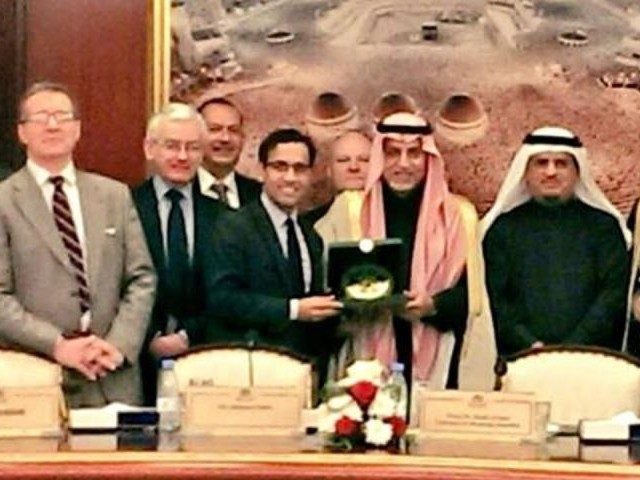The Conservative Member of Parliament who last year convinced Prime Minister David Cameron to refer to Islamic State as “Daesh” has been revealed to be in the pay of the Saudi regime, allegedly taking a monthly sum in return for promoting Saudi propaganda on the floor of the House of Commons.
Rehman Chishti’s push to have Islamic State rebranded came at the behest of Prince Turki Bin Al-Faisal, chief of the Saudi intelligence services between 1977 and 2001. Prince Turki is now chairman of the King Faisal Centre for Research and Islamic Studies, based in Riyadh – which pays Chishti £2,000 a month to advise them on “international relations covering Europe and the Middle East”, according to a meticulously referenced article on Middle East Monitor (MEMO), even though the centre doesn’t list Europe as an area of research.
“[Yes], a Conservative MP really is acting as a paid adviser to a think tank with close ties to the Saudi Arabian intelligence services,” the article affirms.
And it warns: “He has a history of advising foreign governments and defecting between political parties. We should be very wary of his intentions.”
Chishti started his political career with the Labour Party, serving as the vice-chairman of Labour students in Wales and a Labour councillor in Medway, Kent, before contesting the Conservative seat of Horsham, Sussex in the 2005 election.
The following year he defected to the Conservative Party and was elected as MP for Gillingham and Rainham at the following election in 2010.
Since then he has gone on to become Vice-Chair of the All Party Parliamentary Group on Saudi Arabia, under fellow Conservative Daniel Kawczynski, who earned the nickname the “honourable member for Saudi Arabia” for his criticism of Justice Secretary Michael Gove’s decision to cancel a training contract for the Saudi Prison service last October.
In 2011 the pair travelled to Saudi Arabia on a trip costing £3,000 per person, the cost of which was covered by the government in Riyadh. Among the people they met there were Prince Turki and other members of the Saudi royal family, MPs, members of the Shura Council, described in a report held on Mr Kawczynski’s website as “as an Islamic consultation to His Highness, the Custodian of the Two Holy Mosques,” and various government-sponsored human rights organisations.
The following year he called on then Foreign Secretary William Hague to “strengthen our relationship with Saudi Arabia,” in the Commons and received the encouraging reply: “Saudi Arabia is an important ally and an important force for stability and peace in the region, so I salute my hon. Friend’s work with the all-party group.”
And he continued his propagandising efforts on behalf of the Kingdom in January this year, suggesting that Shaikh Ali Al-Nimr, who was executed by the Saudis for protesting peacefully against their regime, was a “terrorist” with links to Hezbollah, citing an article which referenced Saudi sources only as his evidence.
In February of this year Mr Chishti set out again on another Saudi funded trip to the state, this time to the tune of £2,888 per person, where again he met with Prince Turki.
“It was a pleasure to meet with Prince Turki whom I admire and respect. His great knowledge and wisdom on tackling many of the key challenges and issues we face in the world today, should be taken into account when forming international policy,” Mr Chishti said.
And he agreed with the Prince that Islamist terror groups should be labelled “extremists” and “terrorists” rather than “Islamists,” to avoid giving the groups the religious approval they seek.
Upon his return he called on Michael Fallon, the Secretary of State for Defence whether Britain would provide air cover should Saudi Arabia ever deign to send ground troops in against Islamic State.
Fallon responded: “I welcome the contribution that co-operating Gulf states, including Saudi Arabia, which was present at the Daesh meeting in Brussels, are making to the fight against Daesh.”
Perhaps most damningly, Chishti has presented written evidence to the Foreign Affairs select committee in which he testified that “The Kingdom’s approach to human rights has been changing. Although laws are inferred from Islamic Law, to improve clarification, in 2010 the Council of Senior Religious Scholars approved the codification of Islamic Law.
He added: “The Kingdom has also taken action to set up relevant institutions to guarantee the protection of human rights in the country. This includes the Human Rights Commission and the National Society for Human Rights.”
As MEMO notes: “He did not mention that it was government-funded and that a more independent watchdog had been refused a licence by Riyadh two years before. Although allowed to exist informally, the independent organisation’s website is blocked in Saudi Arabia, which is hardly a shining example of a government dedicated to human rights.”
Chishti has declared his income from the King Faisal Centre in line with Parliamentary rules, but MEMO suggests his actions in defending and promoting the Saudi regime within Parliament may fall foul of the Code of Conduct for Members of Parliament which states: “Taking payment in return for advocating a particular matter in the House is strictly forbidden. Members may not speak in the House, vote, or initiate parliamentary proceedings for payment in cash or kind.”
“The Conservative MP on the Saudi payroll should tread carefully,” MEMO warns.

COMMENTS
Please let us know if you're having issues with commenting.